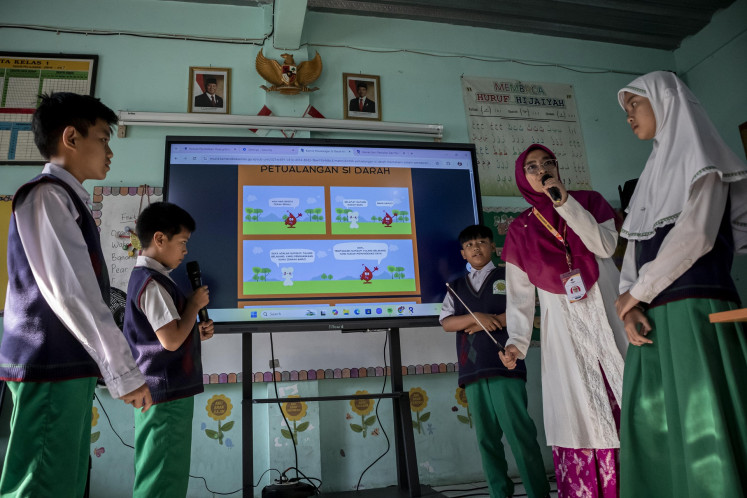How trauma, misleading education cause vaginismus
For the first five years of her marriage, Dara, not her real name, could not find joy in her sex life
Change text size
Gift Premium Articles
to Anyone

F
or the first five years of her marriage, Dara, not her real name, could not find joy in her sex life. She knew she wanted it, but when the time came, all she felt was pent up anger that burst into scratches, pushes and kicks against her husband.
Both Dara, now 28, and her husband were in the dark about what she was going through. All she knew was that whenever penetration was attempted, her vagina would be tightly shut, or in her words, “closed by a brick”.
They kept it quiet from their parents, who kept bugging them to have children and comparing them with other newlyweds with babies. Hopeless, Dara tried asking for opinions from midwives in her town of Tabalong, South Kalimantan, but to no avail. Rather than offering consolation, they instead cornered her by saying that it was sinful not to “serve” her husband.
“I was afraid of God. Is it really sinful not to serve my husband? It haunted me psychologically. Why was it that my sisters and my cousins could but I couldn’t?” she told The Jakarta Post by phone on Thursday.
The problem even interfered with her job. After getting married in 2013, Dara could not finish most of her work and eventually she decided to resign in 2017 to focus on herself.
It was not until June 2018, when she watched an episode of popular talk show Kick Andy, that she finally found someone who had gone through the same experience as her. Through a guest on the show, she found out that she had vaginismus, a condition in which involuntary muscle spasms prevent vaginal penetration and often result in pain during attempts at sex.
She had never heard of the condition before, especially given the lack of sex education that she had received throughout her life.
“It’s important that the right sex education be given to women early on. Parents commonly educate by creating fear that we could get pregnant if we have sex. Some of my friends suffering from vaginismus said they also feared sex because people had told them that the first time having sex would be painful,” Dara said.
Obstetrician-gynecologist (ob-gyn) Ni Komang Yeni said vaginismus was not a definitive diagnosis but a clinical syndrome that often overlapped with a hypertonic pelvic floor, pain, anxiety and difficulties during sexual intercourse.
Vaginismus affects between 1 and 7 percent of females worldwide. It is commonly experienced by women at a productive age and can be caused by various psychosexual factors.
“I was afraid of God. Is it really sinful not to serve my husband? It haunted me psychologically. Why was it that my sisters and my cousins could but I couldn’t?”
Yeni says vaginismus can be triggered by certain psychological conditions, such as stress, trauma from past sexual abuse and anxiety — which is caused by conservative education on sex and parting ways with their mothers after getting married.
Physical factors such as genital infections, wounds and post-birth trauma can also lead to vaginismus.
According to a 1990 qualitative study in the United Kingdom, the three most common causes of the syndrome are: fear of painful sex, a belief that sex is not right or is shameful and a traumatic experience at a younger age.
“Some believe that sexual relationships are embarrassing as they were taught since childhood not to do it or to behave in certain ways. They then cannot change their mindset after getting married, so they continue to see sex and their husbands that way,” Yeni said during a discussion on vaginismus held by Bamed Healthcare in Jakarta on Wednesday.
In Indonesia, there is no recorded prevalence of women suffering from vaginismus, as discussion about sex life is still considered taboo.
Another ob-gyn, Grace Valentine, cited a 2018 study conducted by Cipto Mangunkusumo Hospital in Jakarta that found that 90 percent of the 300 surveyed women had experienced sexual dysfunctions. Although the study does not detail the dysfunctions, Grace suggested that vaginismus was a form of sexual pain dysfunction that was commonly detected among women.
“The study found that only 6 percent of the women admitted they had a problem. This showed a big discrepancy; many women weren’t aware of sexual dysfunctions given that it was a sensitive topic or they were embarrassed and just accepted it as it was,” Grace told reporters on the sidelines of the discussion.
Yeni suggested that vaginismus could lead to further complications, such as increased possibility of infertility, C-section during labor and tensions in marriage. She added that the women could also be deeply affected mentally as they put the blame on themselves and lose their self esteem.
Although in some cases women manage to cure themselves through self-therapy, Yeni recommended that women with severe cases of vaginismus seek help from an ob-gyn and psychiatrist.
Gina Anindyajati, a psychiatrist at Angsamerah Clinic, underlines the importance of factual and correct sex education so women can maintain their sexual health and needs.
“Openness, especially toward their partners, is key in vaginismus therapy. Support from their partners is an important success factor in helping women recover from it. Essentially, vaginismus is a problem for both parties, not only the women. Therefore, both need to work together to get out of it,” she told the Post.
After discovering her condition, Dara joined a Telegram group which is a safe place for around 700 women from across Indonesia to share their stories and support each other.
In 2018, she did four months of vaginal dilation therapy on her own and finally got pregnant, although it was through an “imperfect” penetration. Dara gave birth to her son earlier this year.
After years of keeping it a secret, Dara has openly told her parents and friends about what she went through in hopes that she could help others who were just as clueless as she had been before. She also expressed hope that people could refrain from asking women insensitive questions about their private lives.
“I’m not ashamed. I’d like to think that God had tasked me with starting a wider discussion on vaginismus, so that no more women would be pressured by their in-laws, be cornered or left by their husbands, or think of themselves as useless,” she said.









